
SHIPPING FROM CHINA EXPLAINED
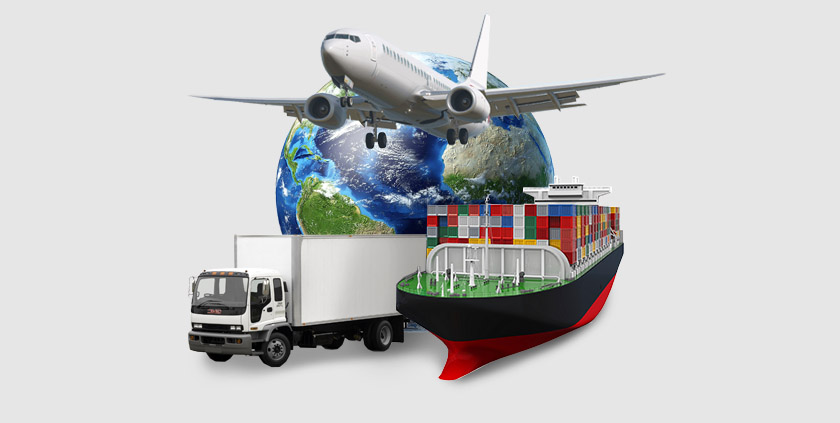
Shipping from China
Among the questions I get from Customers there is one often asked : what are the shipping solutions when I want to import from China? The shipping is a very important step of the importing process and is perceived as a major hassle.
Incoterms, Custom Clearance, FCL, LCL, Bill Of Lading, etc. don't let these terms scare you. In this article I will try to cover everything you need to know about shipping when importing from China.
Incoterms
The trade terms, also known as "Incoterms" for International Commercial Terms, are terms published by the International Chamber of Commerce (ICC) and they are accepted worldwide. It determines when and where a cargo will be transferred between the buyer and the seller. Each terms clearly explain the obligations of the buyer and the seller during a trade.
The most commons Incoterms when importing goods are : EXW, FOB, CIF and DAP. you can see more informations about these terms on the picture below.
In China the commonest Incoterms is FOB, it means "Free on Board Shipping". It includes the transportation of your goods from the factory to the port of destination, with all the export procedures required to legally allow your goods to leave China. However, from the port of import, your goods reaching the final destination is your responsibility.
You'll sometimes hear the terms "door-to-door" and "door-to-port", these terms are services provided by the carrier company. The transport service terms are different than the Incoterms chosen in the contract sale between you and your supplier.
Door-to-door literally refers to DDP Incoterm, your goods will be delivered to the delivery address while including Customs clearance in both ports.
Door-to-port means once your goods reach the port's destination you must make all arrangements for transportation and you have to clear the Customs yourself.
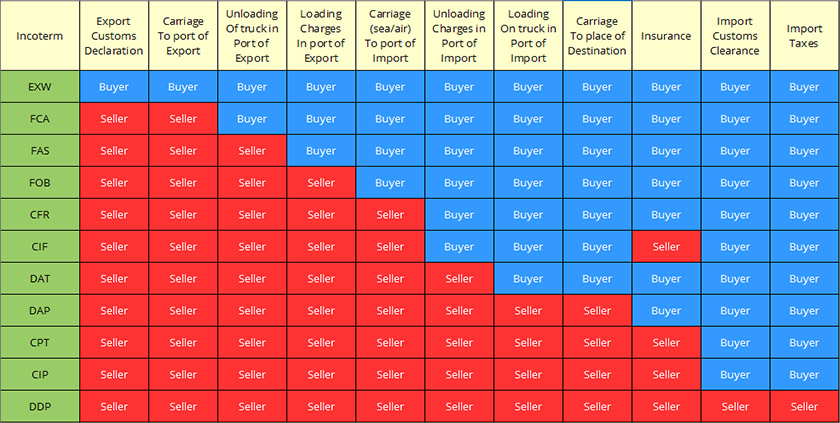
Incoterms explain the obligations of the buyer and the seller
Customs clearance
Before your goods can be shipped to you, they must be cleared for exports, it is also known as "customs clearance". It's the official permission granted by the national custom authority to import and export goods. In order to quickly pass the customs clearance it is important that you prepare all the documents needed.
If the Chinese Custom Authorities check your goods and there aren't the proper documents, you will be fined with thousands of RMB and the shipping of your goods will be delayed. This is the reason I suggest you to work at least under FOB terms.
If you work under FOB terms the documents for the customs clearance are included, you still need to provide some documents needed at your country border. Then be sure to communicate with your supplier or its export agent to manage the customs together.
The documents needed for the Customs vary based on the product you import, but the following documents are always included : Bill of Lading, Invoice, Shipping List, Insurance and Customs Declaration.
You may wonder what is the Bill of Lading. Also known as B/L or BoL, it is a legal document required to move a freight shipment, it is one of the most important document used in international trade. It is issued by the carrier and works as :
• A contract binding you and the carrier.
• A receipt when the carrier has loaded the goods. It is used as a proof of shipment for the customs and the insurance, but also as a commercial proof (especially under FOB Incoterms).
• A title of goods. It is used as a proof of ownership and can be issued in a negotiable or non-negotiable form.
The word "Lading" comes from the old English word and means "Loading"
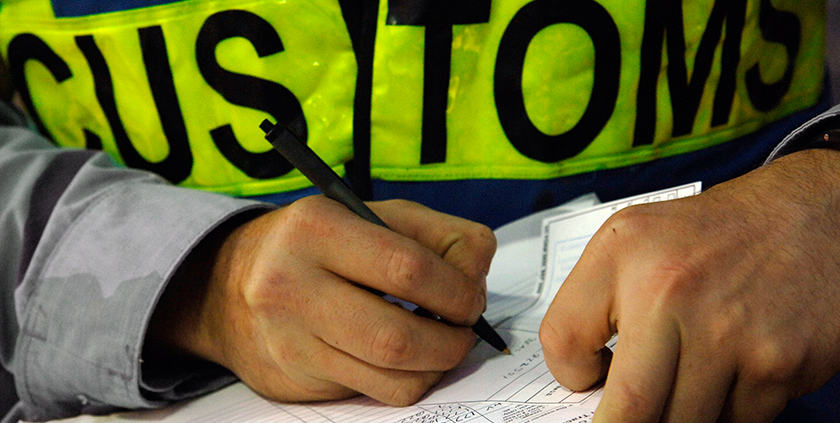
Custom clearance allows your goods to leave China and enter your country
Sea freight
Sea freight is the main method of delivery for most international trade. Most of you will think it's suitable only for big volumes, but you'll be wrong. Sea freight doesn't exclude smaller volumes. There are two possibilities : FCL or LCL.
FCL means "Full Container Load". It doesn't mean you need to fill the entire container but your goods load a container without sharing it with other shipment. FCL is charged based on the container size. It is suitable if you buy large quantity, the freight cost per Cubic Meter(CBM) being lower than LCL.
It is the cheapest shipping solution if your goods fill a full container.
LCL means "Less than Container Load". Your goods and other importers' goods will consolidate together to fill a container, you share a container with them. LCL is charged based on the volume, measured in cubic meter (CBM). It is suitable if you buy low quantities and intend to keep your inventory low. The freight cost per Cubic Meter (CBM) is higher than FCL because there is fees applied from the forwarder.
It is the cheapest shipping solution if your goods don't fill a full container. However, because the cargo need to be filled with other importers, you may face delays.
There are also different sizes of shipping container. But the most common ones are as follow :
When shipping your goods it is helpful to know which container best suit your needs. A 20'GP is designed to carry more weight than volume when a 40'GP and 40'HQ are designed to carry more volume than weight.
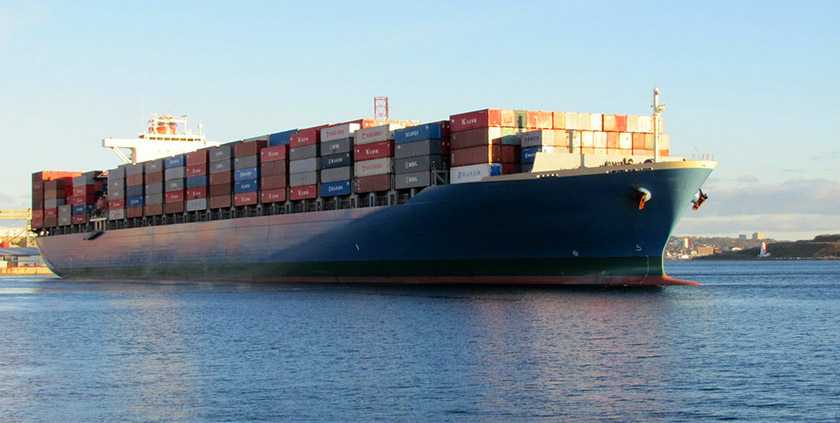
Sea freight is the cheapest shipping solution
Air freight
Air freight is the safest and fastest way to deliver your goods around the world. While Sea freight may take a month to reach its destination, Air freight can let you get your goods, from the factory to your door, in approximately 3 to 10 days. Of course, it is more expensive than Sea Freight. Again there are two possibilities : Courier or Air freight.
Courier is also known as "express" and refers to courier companies shipping your goods from a Point A, your supplier's address, to a Point B, your delivery address. The courier company also handle all the export procedures for you. It is the most expensive shipping solution. It is favoured if you want to order very small quantity and for time-sensitive shipments.
Among the popular courier companies there are DHL, FEDEX, UPS, TNT, EMX and CHINA POST. For each of these courier companies the price and delivery time is different.
Air freight is also known as "Air cargo", while being cheaper than "express" the trade terms follow the same rules as the Sea freight. It is favoured if you want to order big quantities and for time-sensitive shipments.
Most Courier companies, like DHL and FEDEX, provide this service, as well as some passenger airlines.
By Express and Air Cargo the price is based on the weight, but carrier companies use two different units to measure it : Kilogram (kg) and Kilogram Per Cubic Meter (CBM KG).
The carrier companies use the heaviest weight from these two unit measures for the price. Which means if your parcel's weight is 10kg but the the CBM KG shows 15kg, the price will be based on 15kg.
When it comes to Air Freight and Express there is a restriction you should be aware of : any electronic device using lithium batteries are forbidden.
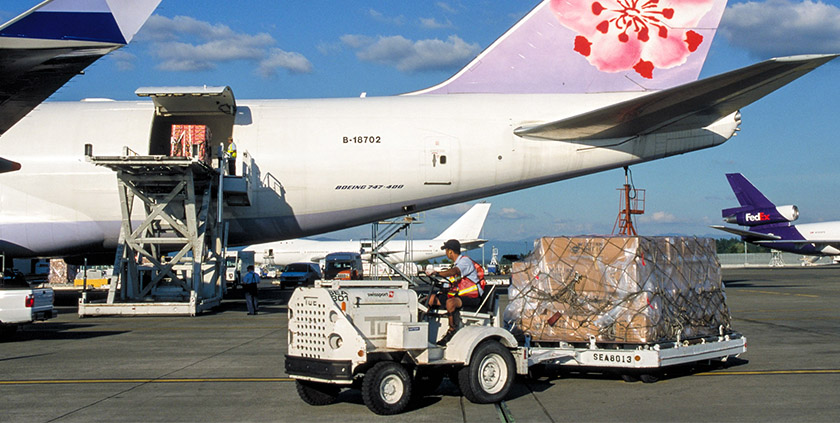
Air freight is the fastest shipping solution
Conclusion
The shipping cost is based on various factors which can also change on a daily basis. But if you want to lower the shipping cost then the only way is to ship larger volumes by sea freight.
Your supplier can help you to book the shipment, however I do not advise you to do so because you'll have a lack of transparency over the process and the cost.
If you are still not comfortable with the shipping and customs, as your sourcing agent I can help you with this procedure. In addition I can also help you with other services, click here for more information.
May 09, 2018 by Nicole